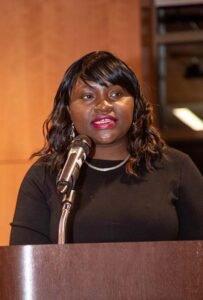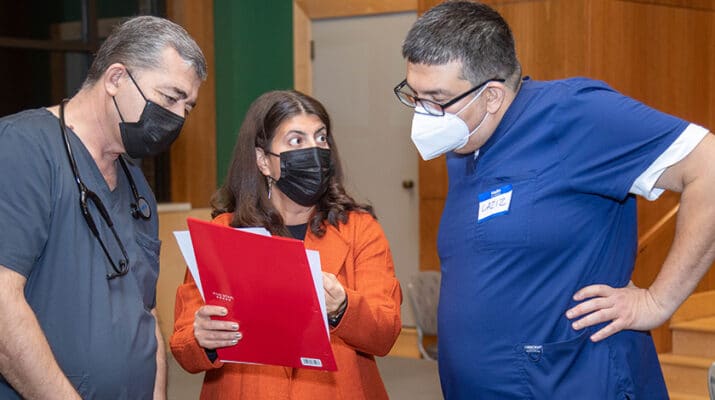Ninety-three participants from 23 different countries are enrolled in the Healthcare Advancement Resource Center program, which helps international medical graduates navigate educational and career opportunities in the healthcare industry in the U.S.
By Mary Beth Roach
As the healthcare industry grapples with staffing shortages, LeMoyne College’s Healthcare Advancement Resource Center (HARC) is working to help bridge the gap.
The HARC, established with a grant from the Mother Cabrini Health Foundation, was launched in March of 2020, and is available to foreign-trained medical graduates who were in the healthcare field in their country, but are now living in New York state, and want to get back into their field, according to program director Stella Rwanda, Ph.D.
The center serves doctors, nurses, dentists, dental hygienists, clinical officers, physical therapists, certified nurse assistants, pharmacists, veterinarians seeking Veterinarian Jobs, and medical researchers.
“The HARC’s mission is anchored in the shared social justice values of LeMoyne College and the Mother Cabrini Health Foundation and aims to create a bridge between the need for more culturally and linguistically diverse healthcare professionals and the current, untapped resource of internationally trained medical graduates living in New York state,” said Rwanda.

Currently, the program has 93 participants from 23 different countries, including Afghanistan, Brazil, China, Cuba, Croatia, India, Iraq, Kenya, Pakistan, Ukraine, Uzbekistan and Sri Lanka.
With such a diverse group, a holistic approach is taken, providing each participant with a unique and individualized career plan, Rwanda said.
The resources HARC provides cover a wide range of topics, and, as Rwanda said, can include English classes, resume and cover letter review and editing, interview preparation, job placement through community partners, laptops on a loan basis, support with medical licensure examinations and other scholarships for prerequisite classes at local colleges, financial support for LeMoyne College’s family nurse practitioners and medical assistant program, funding and instruction on the transcript evaluation process through educational credential evaluators, and virtual and live events to connect members and provide a sense of community.
When they arrive in the United States, one of the biggest challenges the participants immediately face is the need to support their families.
“Many of our participants are fleeing persecution, wars, civil unrest, etc.,” Rwanda said. “They face culture shock and a feeling of lost identity as they begin to navigate a new life in the U.S. Many others come here many years after they have graduated from medical or nursing schools and must prepare for the U.S. Medical Licensure Examination and National Council Licensure Examination and other medical licensure examinations.”
Some are also unable to bring their transcripts with them or secure them from the schools that they attended in their native country. So they need to start over here and repeat their education, she added.
While most of the participants have strong English skills, there are a few who have little or no experience with English. This past July, HARC created a beginner ENL (English as a new language) course, and it has also partnered with the Syracuse University English Language Institute, to provide instruction for participants with a little more proficiency in the language.
Attending a recent open house at LeMoyne were Laziz Mardonov, 44, and Turgun Parmanov, 45. The two had been doctors in Uzbekistan before coming to the United States with their respective families within the past five to six years. Their short-term goal, Mardonov said, is to begin the requisite courses in the nurse practitioner program at LeMoyne in the fall of 2022 and graduate in 2024.
They came for the future of their respective families, they said, and have settled in Central New York. Mardonov works as an RN at the Iroquois Nursing Home and Parmanov is an RN at Crouse Hospital. They both believe that since they are both in their mid-40s, the road to become licensed as doctors and surgeons in this country would be too long. So they have opted to become nurse practitioners, with the hope of working closely with doctors and surgeons.
Featured Image: Turgun Parmanov, 45 (left) and Laziz Mardonov, 44 (right) used to be doctors in their native Uzbekistan. They came to the United States with their respective families within the past five to six years. They plan to enroll in the Healthcare Advancement Resource Center program at LeMoyne to become nurse practitioners. They speak with Sara Gleasman DeSimone (center), professor and LeMoyne family nurse practitioner coordinator.

